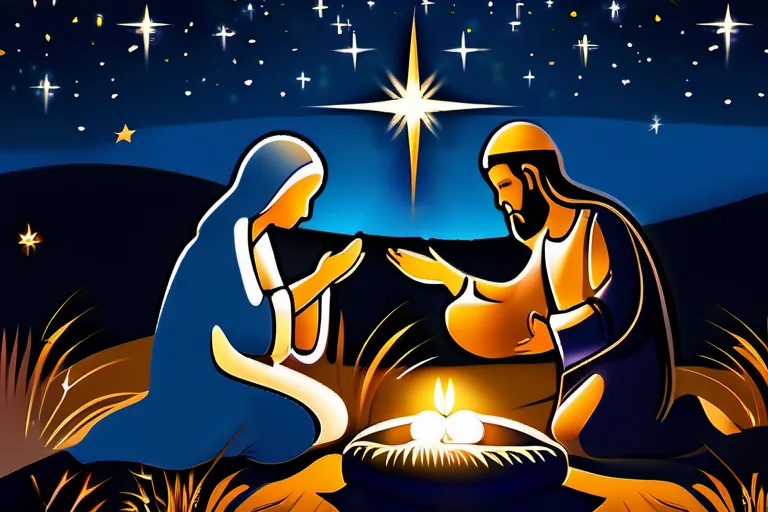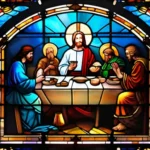Explore the religious, cultural, and historical significance of Christmas Eve in Christianity.
Christmas Eve is a significant day in the Christian calendar, marking the birth of Jesus Christ. This article delves into the religious, cultural, and historical significance of this special occasion.
The Biblical Significance of Christmas Eve
Imagine walking through the bustling streets on Christmas Eve, the air thick with the scent of pine and sweet pastries. As you wander, a question nags at your mind: what does this holy night hold in its embrace? Could it be that beneath the layers of twinkling lights and festive carols lies a deeper significance, one rooted in the pages of Scripture? Let’s explore the biblical events surrounding the birth of Jesus Christ and their connection to Christmas Eve.
Consider the scene: Mary and Joseph journeying to Bethlehem, the city of David. How fitting that this humble couple should travel to a place steeped in history, a place where the lineage of kings once traced back to David himself. And it is there, amidst the ordinary and extraordinary, that the child who would become the King of Kings is born.
Imagine the shepherds keeping watch over their flock by night. How could they have known, as they gazed upon the star in the sky, that a divine sign was pointing them to the very presence of God among them? These men, simple and unassuming, were chosen to be the first to see the newborn King, a testament to the humility of His coming.
As Christmas Eve draws near, think about the angels singing praises in heaven. Could it be that their song is not just for the shepherds but for all humanity? For they bring a message of great joy and peace, ‘Goodwill toward men.’ How can we miss this invitation to share in God’s love during such a sacred night?
The significance of Christmas Eve in Christianity stretches beyond mere celebrations. It is a time to reflect on the birth of Jesus Christ, the fulfillment of ancient prophecy, and the hope that His coming brings to our lives. As we gather with family and friends, let us remember the true meaning behind this holy celebration.
The Cultural and Historical Significance of Christmas Eve
The Cultural and Historical Significance of Christmas Eve: Delve into the cultural and historical traditions associated with Christmas Eve throughout Christian history.
Christmas Eve, that magical night before the dawn of Christmas Day, has always been a time filled with anticipation and wonder. Can you imagine how people in ancient times must have felt as they prepared for the birth of Christus Rex, the King of Kings? In many cultures, it’s a tradition to stay up late on this night, symbolizing the eternal watchfulness of faith. Isn’t it fascinating how a simple act like staying awake can become such an integral part of our holiday rituals?
The history of Christmas Eve is rich with customs that have evolved over centuries. In medieval Europe, for instance, midnight mass became a central feature, marking the beginning of the Christian celebration. It’s almost as if the night itself whispers secrets about the coming birth of Jesus, and the faithful gather in churches to listen intently. What would it feel like to be one of those first worshippers, holding your candle high into the dark, waiting for the light to break through?
Through the ages, Christmas Eve has also been a time for gift-giving, a symbolic act of love and sacrifice, much like the gift given by Mary and Joseph. The practice of leaving shoes out for Saint Nicholas is a delightful tradition that reflects the hope and joy of the season. How can we resist the charm of this custom, which brings both children and adults back to childhood memories?
Historically, Christmas Eve has also been marked by feasts and celebrations. In many parts of Europe, it was customary to eat holy bread, symbolizing the Eucharist and the body of Christ. Can you picture the warmth of a family gathered around the table, sharing this sacred bread with each other? It’s a beautiful way to connect not just through food but through shared beliefs.
The cultural and historical significance of Christmas Eve is a testament to the enduring power of faith. As we celebrate today, let us remember those who came before us and the traditions that have been passed down. Christmas Eve isn’t merely an end; it’s the beginning of a journey filled with hope and wonder.
The Religious Significance of Christmas Eve
The significance of Christmas Eve in Christianity extends far beyond the simple countdown to midnight. It’s a time when the line between reality and expectation blurs, inviting believers to reflect on the profound moment that heralds the birth of Christ.
Imagine standing inside a church, the air thick with the scent of incense as you prepare for the Midnight Mass. This service is more than just a religious ritual; it’s a sacred moment where time seems to pause. As the congregation gathers in anticipation, the atmosphere is electric with a mix of solemnity and joy.
In many Christian denominations, the evening prayer services are particularly elaborate, often featuring the reading of the Magnificat, the lessons from the Old Testament, and the Benedictus. These prayers serve as a bridge between the secular world outside and the spiritual realm within. It’s as if the church itself becomes a living entity, breathing life into the narratives of hope and redemption.
The hymns sung during these services are often filled with deep meaning, invoking images of angels singing in the heavens and shepherds watching over their flocks. These songs serve as a reminder of the humble origins of Christ’s birth, reinforcing the message that even the most ordinary can hold profound significance.
As you sit in the darkness, waiting for the first light to break through, the candles flickering around you create an almost magical ambiance. The symbolic act of lighting these candles represents the enlightenment brought by Christ into the world of darkness and ignorance.
The religious rituals and prayers observed on Christmas Eve are not just about commemorating a past event; they are a call to action, urging Christians to carry the light of hope into their everyday lives. It’s a time to reaffirm faith, to seek forgiveness, and to prepare for the joy that follows the birth of Christ.
So as you find yourself in this sacred space on Christmas Eve, let your heart be lifted by the beauty of these rituals and prayers. May they guide you towards greater understanding and compassion, not just on this night, but throughout the year.
The Symbolism of Christmas Eve
Imagine Christmas Eve as a canvas, carefully painted with symbols and traditions that tell the story of hope and light in the darkest times. What do these decorations and customs mean beyond their festive cheer?
Stars and Wreaths: Have you ever wondered why churches often display a wreath adorned with candles or stars? These symbols represent the guiding star that led the wise men to the infant Jesus. The circular shape of the wreath symbolizes eternity, reminding us that God’s love is infinite and everlasting.
Pine Trees: Evergreen trees like pine are a common sight in homes during Christmas Eve. They stand tall as sentinels of nature, ever-present even when the world seems barren. In many cultures, these trees represent resilience and rebirth, mirroring the promise of new life that comes with Christ’s birth.
Candy Canes: Think about the candy cane, with its distinctive shape and peppermint flavor. Its c shape is reminiscent of a shepherd’s crook, guiding lost sheep back to safety. The red stripes on the white sugar represent the blood Jesus shed for humanity’s sins. This simple treat carries profound symbolism.
Feasts and Fasting: On this evening, many homes are filled with hearty meals and sweet desserts. But have you ever pondered why we indulge in such feasts? It can be seen as a celebration of abundance and the promise that even in scarcity, God’s blessings never run dry. Conversely, some practices involve fasting to reflect on humility and reliance on divine providence.
These symbols are more than just decorations; they are living narratives that weave together threads of faith, hope, and love. As you decorate your home or church this Christmas Eve, consider the deeper meanings behind each piece: a star guiding us to the one who brings light into our lives, evergreen branches offering comfort in winter’s chill, and simple treats carrying messages of salvation.
The Celebration of Christmas Eve Around the World
Imagine walking into a small, dimly lit church on Christmas Eve night. The air is thick with the scent of incense and the rhythmic chanting of hymns fills your ears. This scene, replicated in countless churches across the globe, encapsulates the profound significance of Christmas Eve in Christianity. How does this simple yet profound moment compare to the vibrant celebrations in other countries?
From the bustling streets of Rome, where the Vatican hosts a candlelit Mass under the stars, to the quiet traditions in rural villages where families gather around a single candle symbolizing Christ’s light, each culture has its own unique way of marking this holy night. In somalia, for example, children perform plays reenacting the nativity story, while in Latvia, families exchange small gifts and enjoy a traditional meal featuring mazurek, a layered cake.
In Sweden, Stjärnornas Dagar or ‘Days of the Stars’ involves lighting candles in windows to welcome the star that guided the wise men. Meanwhile, in the United States, the tradition of leaving cookies and milk for Santa Claus on Christmas Eve is a beloved custom that spans generations.
The diversity in these celebrations highlights the universal theme of Christ’s birth uniting people from different backgrounds under one spiritual banner. Each culture interprets the meaning of Christmas Eve through its own lens, but all share a common thread: the joy and hope that accompany the birth of the savior.
The Importance of Christmas Eve in Modern Christianity
Imagine Christmas Eve as a soft whisper on a winter night, gently urging us to pause and reflect. How does this quiet evening fit into modern Christian practices? In today’s fast-paced world, where screens often drown out the real essence of celebration, why is Christmas Eve still so significant?
Consider Christmas Eve as a preparatory candle lit in the dimness before the grandeur of midnight. It’s about setting the stage, kindling the hope and joy that are to come. As families gather around the dinner table or sit quietly at home, there’s an air of anticipation – much like the hush before a thunderstorm. This moment is crucial because it encapsulates the quiet preparation for something greater.
In contemporary Christian practices, Christmas Eve serves as a time to deepen faith and reaffirm commitment. It’s not just about feasting or exchanging gifts; it’s about spiritual reflection and renewal. How many of us take this opportunity to meditate on the silence that surrounds the birth of Jesus, pondering over the stillness and the significance of that quiet night?
The traditions vary widely – from attending midnight mass in cathedrals with their towering spires cutting through the night sky, to lighting Advent candles or exchanging devotional readings. Each practice holds its own unique flavor, but all share a common thread: the belief that this simple evening can hold profound meaning.
Moreover, Christmas Eve is a time for bridging generations. It’s a reminder of the unity and diversity within Christian communities around the world, where traditions might differ but the heart of celebration remains the same. Whether through caroling in churches or sharing stories from family histories, this evening weaves together threads of communal memory and shared beliefs.
So as we navigate through the holiday chaos, let us not forget to pause on Christmas Eve. Let it be a moment when the world outside fades away, and we can truly connect with what Christmas is all about – love, peace, and hope that fills our hearts like the first light of dawn after the long night.
Conclusion
 By understanding the deep meaning behind Christmas Eve, we can appreciate its importance in Christianity and celebrate it with greater reverence and joy.
By understanding the deep meaning behind Christmas Eve, we can appreciate its importance in Christianity and celebrate it with greater reverence and joy.











